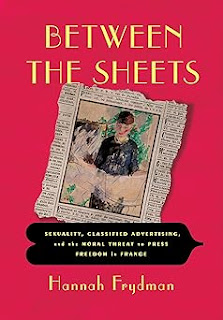
She applied the “Page 99 Test” to her new book, Between the Sheets: Sexuality, Classified Advertising, and the Moral Threat to Press Freedom in France, and shared the following:
On page 99 of Between the Sheets, we find ourselves in the middle of an exploration of the Flachon affair (1911-1912)—in which it was revealed that Victor Flachon, director of the republican daily La Lanterne, and his mistress had purchased sex with minors from a pimp named Nitchevo who published ads in the newspaper—and its use by right-wing, monarchist journalists to critique the French Republic. The page begins with the conclusion of a section, detailing in several sentences how this right-wing critique drew the prominent politician Aristide Briand—a former director of La Lanterne—into the story, asserting that his work in the Chamber of Deputies largely consisted of doing Flachon’s bidding and referring to him as the “minister of Nitchevo.” After this, a new section, entitled “Advertising: A Republican Vice?” begins, zooming in on the fact that coverage of the scandal—which widely informed readers across the political spectrum of the “use of intensive advertising campaigns to attract clients in search of minors”—nonetheless never gives any sense of the content of these ads. This is despite the way they “stand out from the crowd as often long, complex, self-referential, and sometimes even funny,” such as the following ad, which ran in the Miscellaneous column:Visit Hannah Frydman's faculty webpage.Do you suffer from continual anxieties? incurable wounds? Do you have stains on your past? difficulties in the present? concerns about the future? Are you sad, worried, uneasy? Then come quickly to consult me. My business [maison] is not quayside, but on the mezzanine and near metro Villiers! Madame Nitchevo, 34, r. de Constantinople, Mezz. on left.The reader who only reads page 99 would likely be quite confused: even the description of the page I provide above, which gives contextual information not contained on page 99, leaves many details unexplained, including why it matters that it “seems likely that someone well educated” wrote Nitchevo’s ads. That said, and however unceremoniously, the page does nevertheless throw the reader into many topics that are central to my book. Most importantly, a reader of this page would begin to see how concerns about sexual advertising became wrapped up in politics and lawmaking at a variety of levels, from the pages of the press to the halls of government. Between the Sheets more generally shows how classified ads placed by enterprising women like the so-called Nitchevo were at the center of a variety of political, cultural, and legal debates during France’s Third Republic (1870-1940). These conversations and the laws they inspired were spurred on by fears about a falling birth rate supposedly caused by abortion, women’s growing independence, gender subversion, and the supposedly ever-present danger of sex trafficking for innocent white women—all things that the classifieds were seen as encouraging and facilitating. As a danger to the republic and its foundation in sexual normativity, in the form of monogamous, reproductive couples, classified advertising sheds light on the sexual history of republican governance.
--Marshal Zeringue



